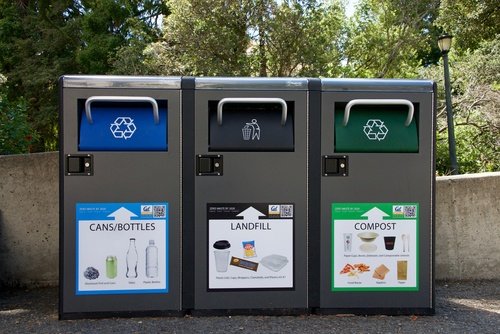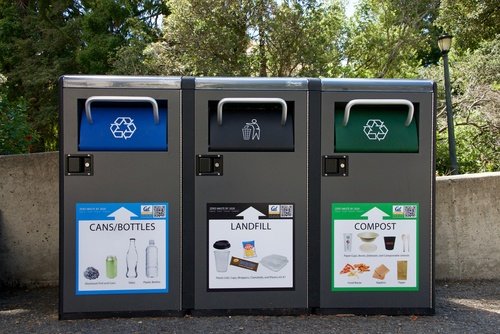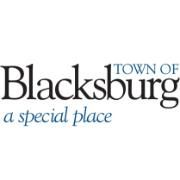Recycle Coach in Action: College Town Success Stories

 If you manage recycling and waste programs in a college town, the student population is your biggest logistical nightmare. Students are itinerant – they roll into town in autumn, pour out again in the spring and disappear entirely a few years later.
If you manage recycling and waste programs in a college town, the student population is your biggest logistical nightmare. Students are itinerant – they roll into town in autumn, pour out again in the spring and disappear entirely a few years later.
This means they’re a lot less invested in the long term health of your city than your permanent residents are; and, therefore, they are less likely to think about proper waste disposal or the benefits of recycling.
Working with student populations can be complex and variable. They may have come from towns with recycling programs different from yours. Depending on their upbringing, they might know little or nothing at all about recycling. They have new priorities, academic and social goals which keep them from thinking about larger community or environmental issues. They might also be facing adult responsibilities for the first time, with varying degrees of success.
Why Students Matter
Collectively, the student population packs a significant environmental punch. Students generate tons of shipping boxes and packing material waste when they move into residences at the start of the school year and again when they move out in the spring. If students don’t receive clear instructions, most of their unwanted furniture, school supplies and household items end up in landfill instead of being repurposed, resold or recycled.
Throughout the school year, each student generates a whopping 640 pounds of solid waste, including an average of 500 disposable cups and 320 pounds of paper. Most of this waste could easily be diverted. Failure to address this problem means a significant and unnecessary burden on both your landfill and municipal waste management budget.
There are other considerations at stake, too. Teaching students best practices today will help you realize measurable results and immediate improvements to your waste diversion rates. Better still, you have the power to create a generation of influencers who will make recycling their priority for life. Meanwhile, a green, sustainable campus makes your town more desirable, which in turn means like-minded students are more likely to stick around, and in turn leads to improved property values and better quality investment in your area.
What To Do
These days, colleges and college towns often find themselves taking on a parenting role when it comes to responsible waste management. The good news is that with the right guidance, today’s college students are an intensely passionate and socially-conscious group of young people who welcome the challenge.
Education is key, and you must be prepared to offer reliable, consistent and easily accessible information. You could opt to create your own program from scratch, or join the dozens of school towns that have already simplified the task by adopting the free Recycle Coach app.
Thanks to the Recycle Coach app, which delivers up-to-date, locally relevant information to students and school administrators, these towns have increased recycling awareness on campus and overcome specific logistical problems on site.
Here are a few examples of schools that have successfully used the Recyle Coach app to get student-generated waste under control:
 College Station, TX
College Station, TX
Half the population in the city of College Station, Texas is made up of college students. Every spring, students moved out, leaving behind an unmanageable pile of excess waste. With so much of their population in flux, the city was having trouble providing students with reliable, easy access to recycling and waste collection schedules.
The city solved this problem by adopting the My Waste app by Recycle Coach, and promoting it to students at orientation and in student living quarters. The project led to a measurable increase in student awareness of recycling schedules and procedures, and the city’s call center logged a significant decrease in incoming calls related to recycling and waste issues as a result.
 Blacksburg, VA
Blacksburg, VA
Blacksburg, Virginia faced a different set of problems. Many of their students live in large apartment complexes – older buildings with single stream disposal chutes that are no longer recycling- or waste-compliant due to age, or with recycling depots placed in inconvenient locations. The city has also been undergoing major infrastructure upgrades to the area roads which affect recycling and waste pickup in the area.
Blacksburg now uses the My Waste by Recycle Coach app to keep students and local residents up to date on curbside recycling schedule changes. Students also make extensive use of the app’s “What Goes Where” reference guide, which reflects both short term collection changes and regular processes.
As a result, residents are now better informed when road paving affect their collection schedules, and “What Goes Where” searches help students navigate complicated recycling processes while the city infrastructure is being rebuilt.